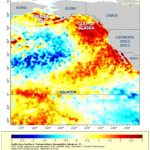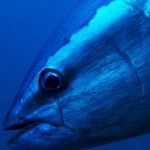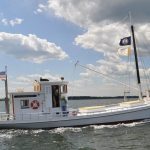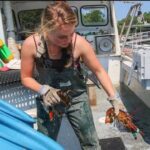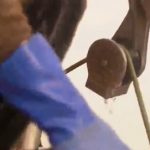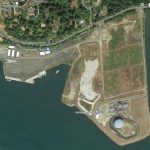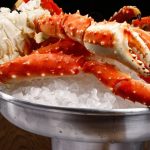Tag Archives: Clean Water Act
Fourth Circuit Limits Reach of Federal Regulation Under the “Major Questions” Doctrine as it Relieves Shrimp Trawlers from Clean Water Act Permitting
 The Clean Water Act (“CWA”) regulates the discharge of certain “pollutants” into waters of the United States (“WOTUS”). Should shrimp trawlers be subject to the regulatory framework under the CWA when they return “bycatch” (unintentionally captured marine life) back into a water of the United States, or when their trawl nets churn up rocks and sand on the ocean floor? Not in the Fourth Circuit, as the United States Court of Appeals recently held in North Carolina Coastal Fisheries Reform Group v. Capt. Gaston LLC. This is perhaps an unsurprising conclusion. The CWA is, after all, intended to regulate point-source pollution discharges into WOTUS—and, therefore, to regulate pollution and discharges. The U.S. Environmental Protection Agency (“EPA”) defines point source pollution as “any single identifiable source of pollution from which pollutants are discharged, such as a pipe, ship or factory smokestack.” >click to read< 10:46
The Clean Water Act (“CWA”) regulates the discharge of certain “pollutants” into waters of the United States (“WOTUS”). Should shrimp trawlers be subject to the regulatory framework under the CWA when they return “bycatch” (unintentionally captured marine life) back into a water of the United States, or when their trawl nets churn up rocks and sand on the ocean floor? Not in the Fourth Circuit, as the United States Court of Appeals recently held in North Carolina Coastal Fisheries Reform Group v. Capt. Gaston LLC. This is perhaps an unsurprising conclusion. The CWA is, after all, intended to regulate point-source pollution discharges into WOTUS—and, therefore, to regulate pollution and discharges. The U.S. Environmental Protection Agency (“EPA”) defines point source pollution as “any single identifiable source of pollution from which pollutants are discharged, such as a pipe, ship or factory smokestack.” >click to read< 10:46
Federal Appeals Court upholds ruling for shrimp trawlers in Clean Water Act dispute
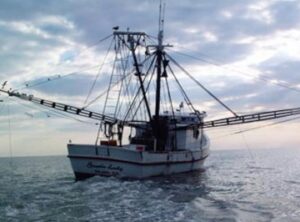 The 4th US Circuit Court of Appeals has affirmed a lower court decision favoring shrimp trawlers in a dispute tied to the Clean Water Act. A three-judge appellate panel agreed unanimously with the dismissal of legal complaints against the trawlers. “Fisheries Reform Group alleges that shrimp trawlers operating in North Carolina’s Pamlico Sound are violating the Clean Water Act by engaging in two types of unpermitted activity: throwing bycatch overboard and disturbing sediment with their trawl nets. But these activities do not violate the Clean Water Act,” wrote Appeals Court Judge Julius Richardson. The seven named defendants in the case are commercial shrimpers in Pamlico Sound. They harvest shrimp by dragging trawl nets along the ocean’s floor. >click to read< 07:58
The 4th US Circuit Court of Appeals has affirmed a lower court decision favoring shrimp trawlers in a dispute tied to the Clean Water Act. A three-judge appellate panel agreed unanimously with the dismissal of legal complaints against the trawlers. “Fisheries Reform Group alleges that shrimp trawlers operating in North Carolina’s Pamlico Sound are violating the Clean Water Act by engaging in two types of unpermitted activity: throwing bycatch overboard and disturbing sediment with their trawl nets. But these activities do not violate the Clean Water Act,” wrote Appeals Court Judge Julius Richardson. The seven named defendants in the case are commercial shrimpers in Pamlico Sound. They harvest shrimp by dragging trawl nets along the ocean’s floor. >click to read< 07:58

Lawsuit claims US federal government violated regulations in approving Massachusetts offshore wind project
A Texas non-profit research institute that aims to promote free enterprise in Texas and the nation is acting on behalf of fishing companies in Massachusetts, a state 2,000 miles away, in a lawsuit that seeks to stop development of the Vineyard Wind offshore wind project. The Texas Public Policy Foundation (TPPF) has named the US Department of the Interior, the US Department of Commerce, the US Department of Defense and other agencies and individuals as defendants in the suit. The lawsuit, filed in December 2021, claims the defendants violated the Outer Continental Shelf Lands Act, the Endangered Species Act, the Clean Water Act, the Marine Mammal Protection Act, the National Environmental Policy Act, and their respective rules and regulations. >click to read< 10:54

Panel hears debate on whether dead fish are pollutants
A Fourth Circuit panel heard arguments Tuesday over whether dead fish dumped back into the water by shrimping boats counts as pollution under the Clean Water Act. “You never know what you’re going to pull up fishing,” attorney Brian David Schmalzbach of McGuireWoods, who argued on behalf of shrimp fisheries, told the three-judge panel.,, And, your honors, contrary to the briefing from the appellees, this is right down the middle of the barrel of the Clean Water Act,” said attorney James L. Conner of Calhoun Bhella & Sechrest, who represents the North Carolina Coastal Fisheries Reform Group, at Tuesday’s hearing. “Are you still arguing that putting live fish back in the water is a pollutant?” Conner began to respond but Rushing interjected with a follow-up question. “You’re not arguing that live fish are a biological material? Only dead fish are a biological material?” she asked. >click to read< 20:00
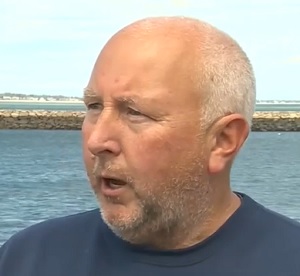
Hundreds rally in Plymouth to prevent nuclear wastewater dumping into Cape Cod Bay
A rally against the proposal by Holtec International, the company that acquired the decommissioned Pilgrim Nuclear Power Station, was held Saturday afternoon at Plymouth Town Wharf. A spokesperson for Holtec said the company is considering other options to dispose of the nuclear wastewater aside from dumping it into Cape Cod Bay. Those options include evaporating the contaminated water or trucking it to an out-of-state facility. “We have 60 full-time commercial lobstermen here. We have the oyster farms and everything. There’s just too much at stake,” said Tom O’Reilly, owner of the lobster fishing vessel “Karen M.” >click to read< 08:22

Trump Dumps Pebble – administration denies permit
The Trump administration on Wednesday denied a permit for a controversial gold and copper mine near the headwaters of the world’s largest sockeye salmon fishery in southwest Alaska. The Army Corps of Engineers said in a statement that the permit application to build the Pebble Mine was denied under both the Clean Water Act and the Rivers and Harbors Act., The agency “concluded that the proposed project is contrary to the public interest,” according to the statement from Col. Damon Delarosa, commander of the corps’ Alaska district. >click to read< 14:41
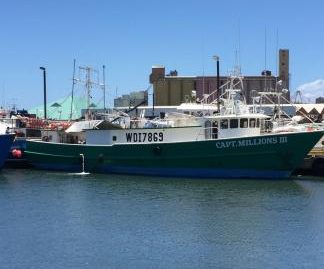
Justice Department fines 2 Hawaii commercial fishing companies over illegal discharge
Two Honolulu-based commercial fishing companies have been ordered to pay civil fines after they discharged oily bilge waste into the Pacific Ocean. Under a settlement reached with the U.S. Department of Justice and the Coast Guard, Triple Dragon, LLC, its company manager and vessel operator have been ordered to pay fines totaling $25,500 for violations of the Clean Water Act and the Coast Guard’s spill prevention and pollution control regulations. The other company, Capt. Millions III, its manager and vessel operator were ordered to pay fines totaling $22,000 for the same violations. >click to read<18:18
Pebble rising?
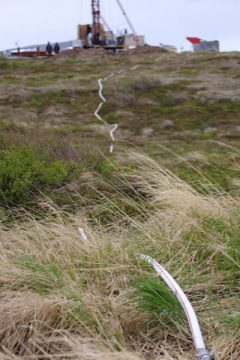 Once thought to be on the verge of death, Alaska’s proposed Pebble prospect copper and gold mine seems to be taking on a new life. First came the July announcement by the Environmental Protection Agency of President Donald Trump that it planned to lift a proposed ban on the mine ordered by the EPA of President Barrack Obama.,,, The Pebble Limited Partnership sued the Obama administration and the EPA of Trump – taking a page from the playbook of enviromental organizations fond of filing lawsuits to leverage legal settlements – in this case negotiated an agreement allowing Pebble to apply for the necessary permits. click here to read the story 09:37
Once thought to be on the verge of death, Alaska’s proposed Pebble prospect copper and gold mine seems to be taking on a new life. First came the July announcement by the Environmental Protection Agency of President Donald Trump that it planned to lift a proposed ban on the mine ordered by the EPA of President Barrack Obama.,,, The Pebble Limited Partnership sued the Obama administration and the EPA of Trump – taking a page from the playbook of enviromental organizations fond of filing lawsuits to leverage legal settlements – in this case negotiated an agreement allowing Pebble to apply for the necessary permits. click here to read the story 09:37
Ocean polluters seek to have convictions overturned
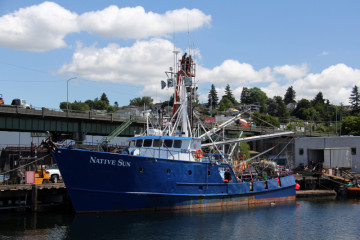 A father-son team that was convicted of polluting Puget Sound and the ocean have asked a judge to toss their convictions. In Seattle federal court on Friday, Bingham Fox asked the judge to throw out his conviction for violating the Clean Water Act. His attorney accused the government of “prosecutorial misconduct.” Fox and his son Randall Fox were convicted of pumping oily bilge water from their 80 fishing vessel “Native Sun.” A deckhand provided the US Coast Guard with a video showing a makeshift pump that pumped engine oil overboard while the vessel was in Blaine harbor. Federal law requires commercial vessels to filter out engine oil and dispose of it properly on shore, which costs time and money. click here to read the story 09:12
A father-son team that was convicted of polluting Puget Sound and the ocean have asked a judge to toss their convictions. In Seattle federal court on Friday, Bingham Fox asked the judge to throw out his conviction for violating the Clean Water Act. His attorney accused the government of “prosecutorial misconduct.” Fox and his son Randall Fox were convicted of pumping oily bilge water from their 80 fishing vessel “Native Sun.” A deckhand provided the US Coast Guard with a video showing a makeshift pump that pumped engine oil overboard while the vessel was in Blaine harbor. Federal law requires commercial vessels to filter out engine oil and dispose of it properly on shore, which costs time and money. click here to read the story 09:12
Processor Fined for dumping oily bilge water and raw sewage in Kodiak Waters
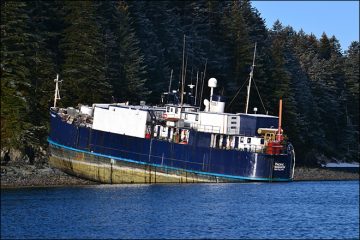 A Washington processing company that owns a Kodiak-based vessel was sentenced in federal court to pay $50,000 in fines after the vessel illegally discharged raw sewage into Chiniak Bay and St. Paul Harbor in Kodiak. In addition, the primary operator of the F/V Pacific Producer was sentenced to a $10,000 fine. Both the operator and the company will serve five years probation. According to a press release from the U.S. Attorney’s office in Anchorage, East West Seafoods LLC was sentenced for violating the Act to Prevent Pollution from Ships, the Clean Water Act, and the Refuse Act, by intentionally discharging oily bilge water and raw sewage. East West owns the F/V Pacific Producer. The primary owner of the processing company and operator of the vessel is 78-year-old Christos Tsabouris of Kodiak. Read the story here 14:40
A Washington processing company that owns a Kodiak-based vessel was sentenced in federal court to pay $50,000 in fines after the vessel illegally discharged raw sewage into Chiniak Bay and St. Paul Harbor in Kodiak. In addition, the primary operator of the F/V Pacific Producer was sentenced to a $10,000 fine. Both the operator and the company will serve five years probation. According to a press release from the U.S. Attorney’s office in Anchorage, East West Seafoods LLC was sentenced for violating the Act to Prevent Pollution from Ships, the Clean Water Act, and the Refuse Act, by intentionally discharging oily bilge water and raw sewage. East West owns the F/V Pacific Producer. The primary owner of the processing company and operator of the vessel is 78-year-old Christos Tsabouris of Kodiak. Read the story here 14:40
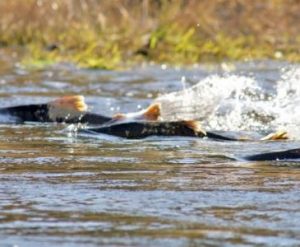
Bay-Delta Water Case Against EPA Advances
A federal judge refused Tuesday to dismiss allegations that the Environmental Protection Agency shirked its duty to review temporary changes California made to its water-quality standards during the drought, an action that environmentalists say shrank the state’s salmon and steelhead fish populations. U.S. District Judge Jon Tigar denied a motion by the EPA to dismiss the lawsuit filed against it last year by the Natural Resources Defense Council, the Bay Institute and Defenders of Wildlife. Tigar said their claims are not moot and that they plausibly alleged that the EPA was required under the Clean Water Act to review the changes to more than two dozen water quality standards to protect fish and wildlife in the Bay-Delta Estuary. Read the story here 13:42

Loving the Puget Sound to Death
Hidden amid the pleasure boats and cargo ships that roar through the canal in northwest Seattle is one of the oldest fishing economies in North America. From midsummer to October, from early morning until after dusk, fishermen from the Suquamish Tribe zoom up and down the canal in orange waterproof overalls, tending to salmon nets that dangle across the water like strings of pearls. The story of water pollution in Puget Sound mirrors that of other urban areas in the country. In the mid-twentieth century, the damage caused by waste and industrial pollution became obvious. Read the rest here 08:08
Could BP, Feds settle in massive 2010 oil spill civil case? Experts weigh in

Is Millstone power plant killing lobsters in the Sound?
 Each day, some two billion gallons of water are pumped from Long Island Sound into the Millstone Power Station in Waterford, Conn. — that state’s only nuclear power plant- and used to help cool systems and support the station’s two operating reactors. Read the rest here 07:42
Each day, some two billion gallons of water are pumped from Long Island Sound into the Millstone Power Station in Waterford, Conn. — that state’s only nuclear power plant- and used to help cool systems and support the station’s two operating reactors. Read the rest here 07:42
Rep. Walter B. Jones, R-N.C., co-sponsors bill to give exemption to fishing vessels
 The moratorium addressed in the bill Jones’ cosponsored was for a federal court ruling in California in 2006 that said EPA was required under the Clean Water Act to issue permits for incidental discharges. Jones said that could include discharges of things as simple as ballast water, deck wash, bilge pump discharge, fish hold water, and laundry and shower water. Congress permanently exempted 13 million recreational vessels affected by the ruling, but approved only a temporary exemption for the 65,000 commercial and charter fishing boats and 15,000 commercial use vessels. [email protected] 23:21
The moratorium addressed in the bill Jones’ cosponsored was for a federal court ruling in California in 2006 that said EPA was required under the Clean Water Act to issue permits for incidental discharges. Jones said that could include discharges of things as simple as ballast water, deck wash, bilge pump discharge, fish hold water, and laundry and shower water. Congress permanently exempted 13 million recreational vessels affected by the ruling, but approved only a temporary exemption for the 65,000 commercial and charter fishing boats and 15,000 commercial use vessels. [email protected] 23:21
Conservation and commercial fishing groups sue EPA over fish consumption in Wash.
![]() SEATTLE (AP) — A fight over how much fish people eat in Washington — and thus, how much toxic pollution they consume — is now in federal court. more@westportnews 22:50
SEATTLE (AP) — A fight over how much fish people eat in Washington — and thus, how much toxic pollution they consume — is now in federal court. more@westportnews 22:50
New evidence points to former EPA official pushing pre-emptive Pebble Mine veto

When it comes to a controversial proposed copper and gold mine near Alaska’s Bristol Bay, the Environmental Protection Agency long has insisted that it is assessing, not regulating. At least not yet. The EPA has repeatedly said it has no plan to pre-emptively veto the mine proposal via a regulatory hydrogen bomb at its disposal in the Clean Water Act — certainly not while the agency is working over its much-disputed assessment of a theoretical large-scale mine’s impact on the Bristol Bay Watershed. more@washingtonexaminer07:37:00
Pebble Mine & the Clean Water Act By Nanci Lyon
![]() While Alaska may host a wide variety of people, thoughts and ideas, I think we can all agree that salmon are an important part of calling this great state home. Whether in our belly, on the end of our line or in our net, salmon feed us, provide jobs and support a multi-billion dollar a year economy. Our salmon are iconic. Read more here
While Alaska may host a wide variety of people, thoughts and ideas, I think we can all agree that salmon are an important part of calling this great state home. Whether in our belly, on the end of our line or in our net, salmon feed us, provide jobs and support a multi-billion dollar a year economy. Our salmon are iconic. Read more here
R.I. Fishermen Rally for Counterparts in Alaska
“We’re reaching out to commercial fishermen on the East Coast because we need the nation’s support on this issue,” Carscallen said. “This is not a question of jobs versus the environment, but of protecting a thriving, lucrative established industry that yields high returns, year after year, for local communities in the Bristol Bay watershed, and the country. This is something that all commercial fishermen can relate to, and we appreciate the support of New England’s fleet.”
Read more here Commercial Fishermen for Bristol Bay






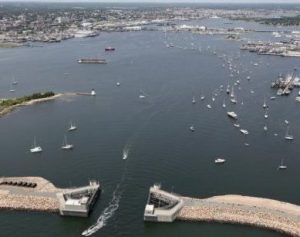
 Fishermen can safely hose down their decks without fear of violating the Clean Water Act. Congress yesterday voted unanimously to extend a moratorium for three years that exempts commercial fishing vessels from needing incidental discharge permits. Senator Lisa Murkowski spearheaded the bipartisan push –
Fishermen can safely hose down their decks without fear of violating the Clean Water Act. Congress yesterday voted unanimously to extend a moratorium for three years that exempts commercial fishing vessels from needing incidental discharge permits. Senator Lisa Murkowski spearheaded the bipartisan push –


























